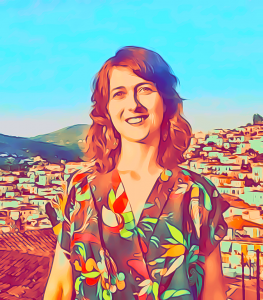177 Letter from Estela Marine-Roig

Dear scholars,
I was born in Catalonia, an autonomous region of Spain, and raised in a middle-class family. From an early age, I went to summer camps in foreign countries to further my language skills (English, French and German). I combined academic studies with a professional career in music, specialising in piano. At the age of 18, I won the first prize in Catalonia for oratory in two foreign languages. At university, I studied Tourism and Humanities for dual bachelors’ degrees. I am now married with two children, and have successfully combined a professional career and family life with the invaluable support of my husband and parents.
I am a Serra Húnter fellow (full professor) in Tourism Marketing at the University of Lleida (UdL) and a collaborating professor of the master’s degree in Sustainable Tourism at the Open University of Catalonia (UOC). In a 2020 call, the Catalan University Quality Assurance Agency (AQU) granted me accreditation as a full professor in Social Sciences; my age at the time was 13 years younger than the average of those accredited. Among the few lecturers who achieve this accreditation in Catalonia, 32% are women and 68% men.
I began my research career during studies for my master’s degree in Tourism Management and Planning under the guidance of my tutor Prof. Salvador Anton Clavé (Rovira i Virgili University). My first line of research was the evolution of the tourist image and identity of Catalonia through travel guidebooks published over the course of a century in France and Germany; the results were presented at several universities in the United Kingdom during 2008 and 2009. At the Spanish TuriTec 2010 conference, I presented my main and current line of research, an analysis of tourist destination images through traveller-generated content, which I developed during my PhD thesis. In December 2013, an international examining board awarded me the mention of Doctor Europeus and the mark of Summa cum laude. The International Federation for Information Technologies and Travel and Tourism (IFITT) awarded me the 2015 IFITT Thesis Excellence Award for a Doctoral Thesis; among the competing nominees, the thesis stood out for its innovativeness, scientific rigour, and relevance to the field of tourism. This research line seems inexhaustible; after 10 years and numerous publications, new challenges that allow me to advance my research continue to appear. Among the awards I have been honoured to receive, the 2018 Catalonia Tourism Medal for the best knowledge and research project (DOGC 7735) stands out because, previously, it had not been awarded to an individual researcher.
My primary recommendation for future researchers is that you choose a topic or line of research that you truly enjoy and are passionate about because you will have to dedicate not only innumerable hours but often many years to it, and the path is marked with challenges and difficulties. Moreover, the topic you choose is key since, following your doctoral thesis, you will become experts in that field and be recognised by it. I also strongly recommend attending conferences/congresses in your chosen field and presenting your research at them, as well as publishing articles during your thesis, in order to obtain research accreditation as soon as possible. Although university systems differ in different countries, in many cases, possessing research accreditation is essential to be able to work as a lecturer and researcher at a university. In addition, it is very important to safeguard and organise all your official documents (certificates, diplomas, etc.) and to request certificates for everything that you do (courses, congresses, seminars, language studies, etc.) in order to build your CV and be able to seek accreditations or academic posts. I strongly recommend that students receive complementary education during their master’s and PhD years; universities offer many specific courses related to research and teaching that are highly useful. In general, it’s also important to maintain close contact with your thesis supervisor, as well as with other researchers and PhD candidates of your department or research group. Such a network will enable you to share concerns, doubts, experiences, and information, and this is important as, although we may feel very lonely at times, most people undergo a similar process when developing their PhD thesis. Finally, I would especially encourage young women to pursue your goals and a career that fulfils you, and to keep strong and persevere as the path is sometimes even more difficult for us.
Best wishes,
Estela Mariné Roig
University of Lleida (UdL), Catalonia, Spain
Open University of Catalonia (UOC), Spain

